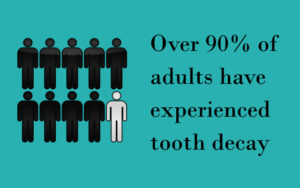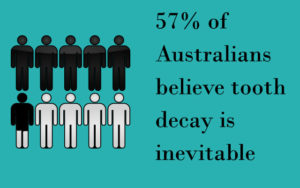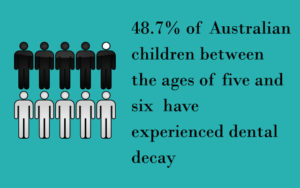Have you ever experienced tooth decay? If you said yes then you’re with the majority of Australians
While it seems like a fair assumption to say that Australia’s most common health problem would be the flu, or any number of other medical concerns, surprisingly tooth decay is the most common health problem in Australia.
Over 90% of adults have experienced tooth decay according to the survey “Adult oral health and dental visiting in Australia” which was conducted by the Institute of Health and welfare.

Avoid the confusion: tooth decay is preventable
Did you know Australia’s most common health problem is actually avoidable?
A study conducted by the Australian Dental Association reported that 57% of Australians believed tooth decay was inevitable.

Dr Craig Duval and the team at Sherwood Dental are committed to turning these worrying statistics around, one patient at a time. Our dental professionals believe that the first step of change is creating a better understanding about oral health.
The fact that dental decay is preventable is paramount in the effort to turn Australians’ dental health around.
There are 11 million newly decaying teeth in Australia every year
That is roughly the same amount of decaying teeth as the entire population of Greece!
Each of these decaying teeth represents potential discomfort, time and money for the person. By adopting healthy dental habits, as well as regular visits to the dentist, many of these teeth could have been protected.
Did you know tooth decay is 5 times more common in children than asthma?
Further research conducted by the Australian Institute of Health and Wellness found that 48.7% of Australian children between the ages of five and six years have experienced dental decay in the past.

Furthermore, the average number of teeth with cavities per child was 2. This research also stated that tooth decay is 5 times more common in children than asthma.
More Australians than not avoid visiting the dentist
Over 61% of Australian adults have an intermediate or unfavourable pattern of visiting the dentist. These figures also coincide with an overwhelming amount of dental concerns, compared to the 39% who enjoyed a more favourable dental visiting pattern.
These figures were found in the survey “Improving oral health and dental care for Australians” conducted by the University of Adelaide.
So what can you do?
While these figures can be alarming, it’s important to realise that your dentist is here to take care of your teeth, not to pass judgement about dental cavities. At Sherwood Dental we practice blame-free dentistry; Dr Crag Duval is only concerned with your comfort while you are visiting us and the health of your teeth.
The four steps towards great oral health
You can strive to avoid dental cavities by performing these 4 steps:
- Brushing twice daily
- Flossing once daily
- Seeing the dentist every 6 months
- Leading a healthy lifestyle
It is important to note that while brushing and flossing are essential parts, these steps alone will not provide you with 100% protection. Regular exams and x-rays can identify problems sooner, like decay, failing fillings, cracks and abscesses. In addition to intercepting problems, these appointments can help to prevent concerns before they even develop. A full examination, clean, fluoride treatment and any necessary x-rays can help to remove plaque and tartar that can cause tooth decay.




 Treating dental phobia
Treating dental phobia





